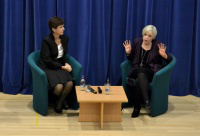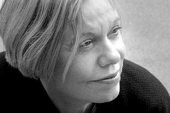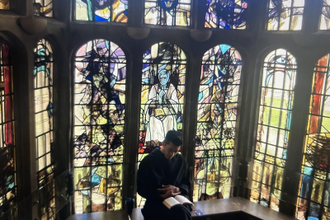Karen Armstrong speaks on 'the point of religion' at St Andrews

Author Karen Armstrong gave a lecture on 'The Point of Religion' as part of the University of St Andrews in Fife on Monday.
Introduced by the Principal of the university, Dr Louise Richardson, as "a voice on ecumenical understanding who wants to make religion accessible," Armstrong began with how we talk about God. She said St Thomas Aquinas would disagree with the definition that has been developed that God is a supreme being, and that all religious language is symbolic and analogical, not literal.
Karen Armstrong is a former nun of the Society of the Holy Child Jesus. The author of twelve books on comparative religion, she has been described as holding a more mystical faith now, compared to her beliefs in earlier years. Armstrong received the TED prize and is known for her international best seller, 'A History of God: The 4,000 Year Quest for Judaism, Christianity and Islam'.
The best model for religion, according to Armstrong, is the Brahmodya competition. Practised by Brahmin priests in the 10th century, it involved spiritual exercises like fasting and meditative breathing, with questions afterwards. The goal of these questions was to come up with formulations to describe Brahman. One priest would come up with a definition and another would try and build on it. The one who won though was the priest who reduced the others to silence, emphasising the "impotence of speech". Referring back to transcendence, she said that religion should push us forward towards it. However this is not done through attempts to explain the mysterious, but through the silence. "Like the end of a symphony when the last notes die out ... the silence that is very full and pregnant before the applause." For Armstrong, "Very good theology wants to live in the silence."
She went on to say that we in the West had lost our sense of "myth," defining it as "essentially a program of action." Reiterating her point, Armstrong stressed that religion is a practical discipline, but sadly it has evolved into something else: a watered down version of what it means to be religious. She said, "Religious people find that rituals or mythoi give them a reach that those sitting in the pews do not understand." In other words, for Armstrong, to be religious is very much about practicing what one believes. Though even the term belief has lost its meaning today. As she said, "We have a fetish about belief in the West." Today it has become a philosophical term of simply accepting a set of propositions, rather than it's original meaning in Greek or the word credo in Latin. It is about act and commitment, not just "intellectual acceptance of a somewhat dubious proposition."
Talking about her past as a former nun of the Society of the Holy Child Jesus, she said she never associated religion with compassion, but grace and kindness. Though later in her life, even after she vowed never to return to religion after leaving the community, she was continually pushed towards compassion - something she believes the world religions have developed. This sense of compassion is ultimately found in the “Golden Rule” found earliest in Confucius' writings: "Do not do to others what you would not like yourself. Then there will be no resentment against you, either in the family or in the state."
For Armstrong, if the Golden Rule is not practiced then "we will not have a viable society in this age." The violence and conflict of the past are reflections where the Golden Rule has not been practiced. “We need to build a community where people of all persuasions can live in harmony and respect. It's not just a nice thing to do, but is necessary for our existence." To end her talk, she used the example of "The Persians" written by Aeschylus to reiterate the importance of compassion. True compassion is "putting yourself in the position of another, loving one another ... We become most god-like when we realise others are in pain."
Speaking at St Andrews as part of the 600 Lecture Series, held as part of a three-year celebration of the 600th anniversary of the university, Armstrong was granted an honorary degree yesterday.
















